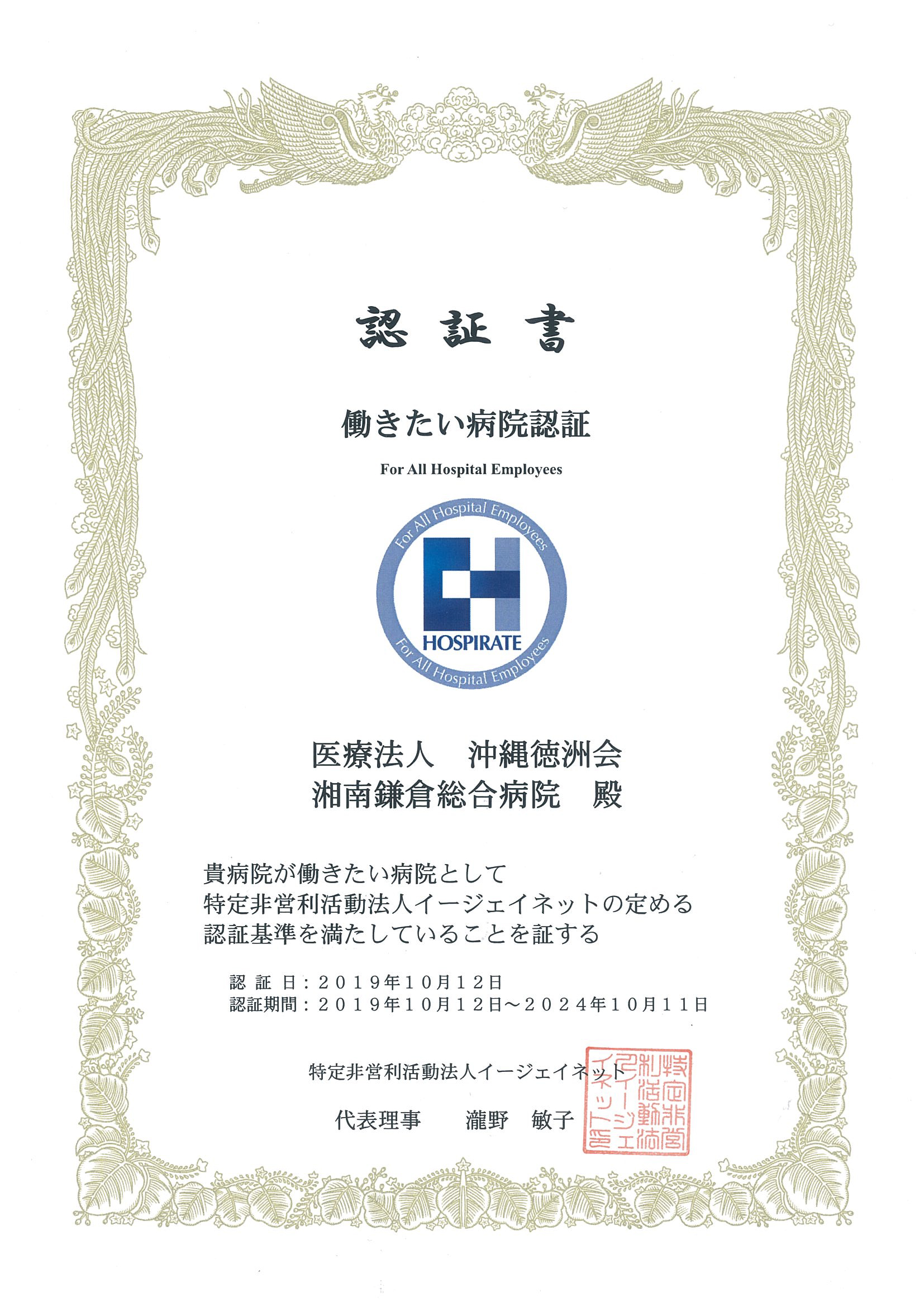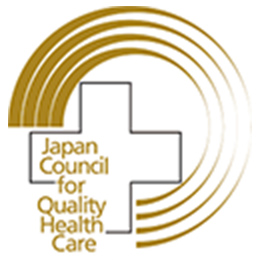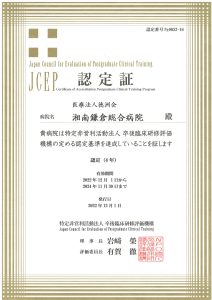Accreditation & Initiatives
Joint Commission International (JCI)
Shonan Kamakura General Hospital received accreditation from the international healthcare evaluation body, Joint Commission International (JCI), in October 2012 and has continuously maintained its certification since then.
JCI is an accreditation organization which evaluates the patient safety, provision of the high-quality medical care, and the structure of continuous improvement activities with rigorous international standards. The survey by JCI is performed every 3 years and become more intense to be reaccredited.
Shonan Kamakura General Hospital strives not only to evaluate its operations from its own perspective but also to receive assessments from certification bodies with the world’s most stringent standards. By doing so, we aim to continue providing patients and their families with the highest quality, safe, and reliable medical care.
Shuzo Kobayashi, M.D., Ph.D.
President-CEO, Shonan Kamakura General Hospital
About JCI
Joint Commission International (JCI) founded in 1994 as an international non-profit affiliate of The Joint Commission (former JCAHO: founded in 1951). Head office of JCI is located in Chicago, and there are branch offices in Milan, Dubai and Singapore. JCI has now accredited approximately 1000 healthcare organizations in over 70 countries. The mission of JCI is to continuously improve the safety and quality of care in the international community through the provision of education and consultation services and international accreditation and certification.
Japan Medical Service Accreditation for International Patients (JMIP)
Shonan Kamakura General Hospital is the first in Japan to receive the Japan Medical Service Accreditation for International Patients (JMIP) certification. JMIP, which stands for Japan Medical Service Accreditation for International Patients, is a certification system designed to facilitate the smooth acceptance of international patients, ensuring they can safely and securely receive medical services in Japan. This program was established by the Ministry of Health, Labour and Welfare as part of a national initiative to promote the seamless integration of international patients into Japanese healthcare facilities. The certification is conducted by the Japan Medical Education Foundation, which evaluates medical institutions’ readiness to accept international patients from a neutral and fair standpoint.
The survey is consisted of following five components.
- Acceptance
- Service for patients
- Management of provision of medical service
- Organizational frameworks and management
- Activities for improvement
After obtaining Joint Commission International (JCI) accreditation, we anticipated an increase in international patients and decided to undergo the JMIP certification process to ensure a safe and secure environment for them. One of the improvements includes installing English and Chinese floor guides next to the elevators. Additionally, other hospital signs are being updated to include both Japanese and English. Various documents, such as explanatory materials, consent forms, and menus, have also been translated into English. Furthermore, procedures for requesting interpreters have been established, and methods for inter-departmental coordination have been determined to ensure smooth operations across all departments.
However, obtaining certification does not equate to a perfect system. It is essential to identify issues from our experience of dealing with international patients and continuously strive to improve them. Moreover, to ensure that there are no differences in the care provided based on patients’ nationality, language, or religion, it is crucial to educate and train all staff on culture and language within the established system. International Medical Support Center on the second floor is specializes in managing international patients, organizing information, and ensuring smooth operations without inconveniencing any patients.Through these efforts, we promote the activities in response to changing times to achieve the one of Tokushukai group’s mission “Everyone receives equal medical treatment”.
HOSPIRATE
About HOSPIRATE
On October 4, 2009, Shonan Kamakura General Hospital became the first hospital in Kanagawa Prefecture to receive the HOSPIRATE certification from the NPO ejnet. This certification was renewed in October 2014 and again in October 2019. The evaluation recognizes how the hospital creates a “work-friendly environment” by balancing work, childcare, and household responsibilities (work-life balance) for its employees.
Japan Council for Quality Health Care(JQ)
Shonan Kamakura General Hospital has undergone a renewal evaluation by the Japan Council for Quality Health Care(JQ) and received its fifth certification.
In October 2023, we underwent the renewal evaluation for the Hospital Accreditation (3rdG: Ver.3.0) and were issued a certification for the “General Hospital 2” category.
• The certification period for “General Hospital 2” is from December 8, 2023, to October 20, 2027.
At our hospital, we continuously use this “Hospital Accreditation” as part of our efforts to provide safe and advanced medical care to our patients. We are committed to our philosophy of not refusing patients and always strive to improve patient safety and service quality. If you have any comments or suggestions, please feel free to submit them.
About Hospital Accreditation
This system evaluates the functions of medical institutions, including hospitals, from a neutral, scientific, and professional perspective, and certifies that they provide high-quality medical care from the viewpoint of a third party. It can be considered a “higher-level evaluation” that takes into account the needs of patients and changes in the social environment.
Additionally, as a third-party evaluation, it assesses the quality of medical services from three aspects: structure, process, and outcome. Therefore, it can be effectively utilized as a tool for hospital improvement.
Japan Council for Evaluation of Postgraduate Clinical Training (JCEP)
The accreditation by the Japan Council for Evaluation of Postgraduate Clinical Training (JCEP) has been renewed.
Our hospital continuously trains 43 junior residents (first and second-year postgraduates). Shonan Kamakura General Hospital received initial accreditation from the Japan Council for Evaluation of Postgraduate Clinical Training (JCEP) in December 2008 and has continuously renewed its certification to this day. The council particularly praised our efforts in training residents with practical skills, especially in emergency medicine, and the highly motivated residents who support and challenge each other during their training.
We will continue to enhance our training programs and strive to develop excellent physicians.
About the Japan Council for Evaluation of Postgraduate Clinical Training (JCEP)
The Japan Council for Evaluation of Postgraduate Clinical Training (JCEP) was established in 2007 with the aim of improving and enhancing the quality of medical care for the public. By assessing the training programs and conditions at clinical training hospitals, JCEP contributes to the enhancement of these programs and the cultivation of skilled physicians.
Quality Improvement (QI) Center
Introduction of Quality Improvement (QI) Center
Shonan Kamakura General Hospital upholds the philosophy of being “a hospital that protect your health to increase your peace of mind” and “a hospital that helps maintain your health for a better life.” To actualize these principles and aspire to be a “compassionate hospital,” we established the QI Center in 2014 with the goal of promoting systematic and continuous quality improvement.
The “QI” in QI Center stands for Quality Improvement. Additionally, we aim to incorporate the meaning of Quantitative Indicator into QI. Quality Improvement (QI) begins with understanding the current situation and identifying areas for improvement (analysis), followed by planning and implementing measures. The effectiveness of these measures is then verified, and if positive results are obtained, the measures are standardized, completing one cycle of Quality Improvement (QI). When advancing PDCA (Plan-Do-Check-Act), it is important to use quantitative indicators for analysis and verification. Furthermore, by incorporating scientific approaches such as statistical analysis into the process of analysis and verification, we believe that quality improvement can be carried out more effectively and continuously.
The QI Center plays a leading role in driving quality improvement in line with the hospital’s strategy. Currently, it promotes quality improvement through project-based initiatives focused on five hospital-wide indicators, while also supporting the improvement of over 70 department-specific indicators strategically set by each department. This quality improvement activity is overseen and guided by the hospital’s governance structure, with participation and leadership from the board of directors and executives.

Director of QI Center,
Vice Director, Takayasu Ohtake
Medical Safety Management
In accordance with the “Shonan Kamakura General Hospital Medical Safety Management Guidelines,” we have established a Medical Safety Management Department within the hospital to oversee cross-organizational safety management. Additionally, we have structured a medical safety management system to ensure the organization operates effectively and efficiently.













